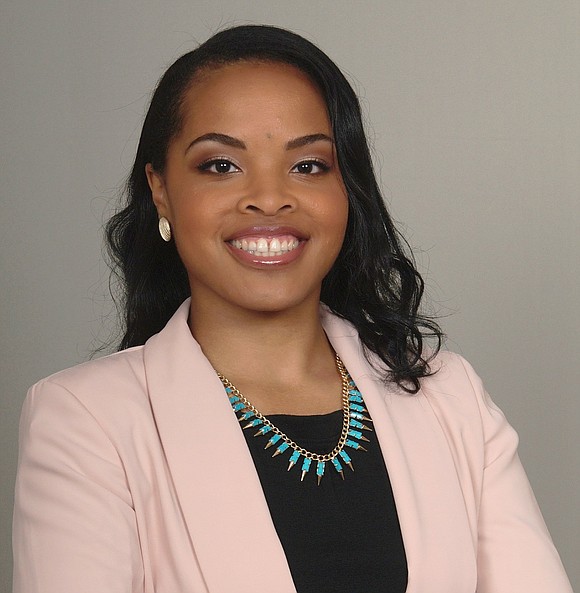This Millennial CPA Gave up Her Corporate Benefits to Pursue Her Dream of Earning a Ph.D.
Porschia Nkansa discusses what it takes to earn a Ph.D.
Style Magazine Newswire | 4/14/2017, 11:15 a.m.
Research shows that less than 1% of African Americans are obtaining Ph.D.s each year in the United States, and if you’re a first-generation college student from the West Side of Chicago, chances are slim that you’ll even obtain a bachelor’s degree, let alone consider walking down the aisle to receive a Ph.D. Well, there is one modern day millennial, who has defied all statistics by walking a path that is uniquely her own. Meet
Meet Porschia Nkansa; a number-crunching sorority girl whose résumé of accomplishments would light up any Fortune 500 CEO’s face with enthusiasm to hire her. She graduated from DePaul University with accolades that would fill office walls of any top executive. Not only was Nkansa a frequent occupier of The Dean’s List, but she was also a scholarship magnet; earning both the Frank K. Ross Scholarship Award from the “big-four” accounting firm K.P.M.G. L.L.P. and the Illinois CPA Society Herman J. Neal Accounting Scholarship. Her achievements earned her a job offer as a tax associate for one of the four largest accounting firms in the world.
If you think you’ll catch this millennial resting in a cave after achieving one victory—think again. Nkansa always had her eyes set on captivating opportunities; passing the exam to become a Certified Public Accountant (CPA) was her next goal. Her first attempt to become a CPA was met by tons of opposition, including a sequence of failing scores, which humbled her tremendously. Two years later, she dusted off her CPA Review Books and remained focused, until she was able to claim the title of CPA.
Nkansa then attended the Ph.D. Project Conference, which inspired her ambition to cross another goal off her bucket list, becoming a professor. The Ph.D. Project is a nonprofit organization, which seeks to increase the number of minority business professors by providing mental and financial support to talented students. After seeing all of the minority professors at the conference, hearing their Ph.D. stories, and networking with other aspiring Ph.D.s, Nkansa knew that this was the path for her. Today, Nkansa is an assistant professor at California State University-Los Angeles, inspiring the next generation of accounting leaders.
BLACK ENTERPRISE caught up with Porschia Nkansa to discuss her journey to becoming a Ph.D.:
BE: Why did you want to obtain a Ph.D. in accounting?
Porschia Nkansa: I realized that I wanted to be an accounting professor during my undergraduate studies at DePaul University, while working part-time as a supplemental instruction leader for the introductory accounting course. Because I valued when my professors discussed their work experience during class, I knew that I wanted to work for a few years, before pursuing a Ph.D.
After passing the CPA exam during my working years, I started taking GRE and GMAT prep classes to obtain a competitive score for Ph.D. program applications. I also attended The Ph.D. Project November Conference in 2005 and 2010. This helped me gain insight into what to expect in a Ph.D. program, and allowed me to meet university representatives, who I kept in touch with during the application process.
BE: What does it take to obtain a Ph.D. in accounting?
Nkansa: It takes grit, perseverance, thick skin, encouragement, and support to obtain a Ph.D in accounting. You have to be willing to put in long hours to manage coursework for seminars and statistics classes, read research papers, and gather and analyze data. You must have thick skin to withstand critiques from senior faculty/advisers on your research ideas and papers. Most importantly, encouragement and support from family, senior faculty/advisers, cohort members, friends, and other Ph.D. students will keep you motivated and focused on finishing the program.
BE: What are some common myths that people have about the Ph.D. process?
Nkansa: Two common myths are that you have to be really good at math, and that it takes forever to finish. While it is true that business-oriented schools prefer high quantitative scores on the GMAT, you can improve your math skills after entering a Ph.D. program by taking statistics and econometrics courses. Generating research ideas and having good writing skills are just as important as mathematical ability.
The individual determines how long it takes to finish their Ph.D. I finished mine in five years, mostly because I changed my research area and worked as a doctoral intern at the Public Company Accounting Oversight Board in Washington, D.C. for six months. Some of my Ph.D. peers finished their programs in four years, while others took longer. The time-frame depends on personal factors and priorities.
BE: Are there any scholarships and awards available for Ph.D. students?
Nkansa: I received the Minority Accounting Doctoral Scholarship from the KPMG Foundation. I was also awarded the AICPA Fellowship for Minority Doctoral Students from the AICPA Foundation. The University of Memphis School of Accountancy honored me with the Excellence in Teaching Award. The Institute of Internal Auditors Research Foundation recognized me as the recipient of the Michael J. Barrett Doctoral Dissertation Award.
BE: What advice do you have for anyone considering a Ph.D.?
Nkansa: Hone-in on your time management skills, because there is a lot of juggling of various demands as a Ph.D. student—coursework, preparing to teach classes, writing, and having a personal life. It is a tough journey, but a worthwhile challenge. You must also have a strong support system to get you through.
No two days will be alike, so you have to learn to adapt to your changing environment. This was difficult for me at first, because I like structure. Lastly, perseverance is key.
Nkansa proves that, with a cup of determination, a handful of loyal supporters, and an unmeasurable desire to achieve, anything is possible.
For more information go to http://www.blackenterprise.com




